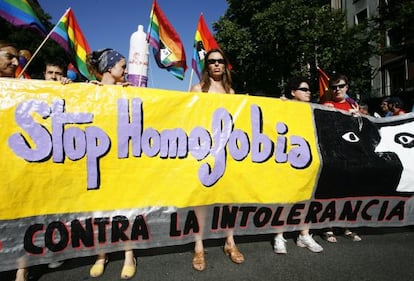Madrid urges more victims of homophobic attacks to go to police
Government delegate unveils plans encouraging gay community to report hate crimes


The Madrid region has launched an awareness campaign to encourage gays and lesbians to report homophobic attacks. Cristina Cifuentes, the central government’s delegate in Madrid, joined with members of COGAM, which represents the capital’s homosexual community, on February 15 to announce the campaign.
“The number of reports filed in relation to crimes linked to sexual orientation or identity grew from 12 in 2013 to 21 by the end of 2014,” said Cifuentes.
Raft of measures
- Leaflets giving advice on identifying a hate crime and calling on victims to report attacks to the police will be distributed in schools, colleges, universities, and police stations.
- José Ramón Murillo, a senior Madrid police officer, has been appointed to mediate with gay rights groups and victims of hate crimes. Murillo has been praised by gay organizations "as a model of best practice."
- The meeting between Madrid government delegate Cristina Cifuentes and COGAM focused on improving procedures at the capital's central police stations, which will involve training officers.
- At the same time, it was agreed that action needs to be taken in schools to identify and stop homophobic behavior, and that will include presentations by police and Civil Guard officers.
- The measures also highlight the growing use of the social networks by extremists of all types, from racists to homophobes.
A spokesman for COGAM added that while the number of people prepared to come forward to report attacks has increased, it believes the vast majority of homosexuals still do not. “They’re afraid of reprisals, that they won’t be protected, that they won’t understood,” he said.
In 2010, the European Commission asked the European Agency for Fundamental Rights to collect data on discrimination and crime against gays, lesbians and transsexuals.
The survey, released in May 2013, showed that 46 percent of Spanish respondents claimed to have been the victims of attacks or violent threats over the past year, one percentage point above the EU average. Yet only 18 percent had filed formal complaints, one point below average. COGAM says the figure is even lower, at 11 percent.
The younger the victims, the greater the likelihood that they have not told their friends and family about their sexual preferences, say gay rights groups.
Last year, the FELGTB national federation launched a campaign under the slogan “No te calles, ¡denuncia!” (or, Don’t stay silent, report it!), urging victims and witnesses to report attacks.
Tu suscripción se está usando en otro dispositivo
¿Quieres añadir otro usuario a tu suscripción?
Si continúas leyendo en este dispositivo, no se podrá leer en el otro.
FlechaTu suscripción se está usando en otro dispositivo y solo puedes acceder a EL PAÍS desde un dispositivo a la vez.
Si quieres compartir tu cuenta, cambia tu suscripción a la modalidad Premium, así podrás añadir otro usuario. Cada uno accederá con su propia cuenta de email, lo que os permitirá personalizar vuestra experiencia en EL PAÍS.
¿Tienes una suscripción de empresa? Accede aquí para contratar más cuentas.
En el caso de no saber quién está usando tu cuenta, te recomendamos cambiar tu contraseña aquí.
Si decides continuar compartiendo tu cuenta, este mensaje se mostrará en tu dispositivo y en el de la otra persona que está usando tu cuenta de forma indefinida, afectando a tu experiencia de lectura. Puedes consultar aquí los términos y condiciones de la suscripción digital.








































